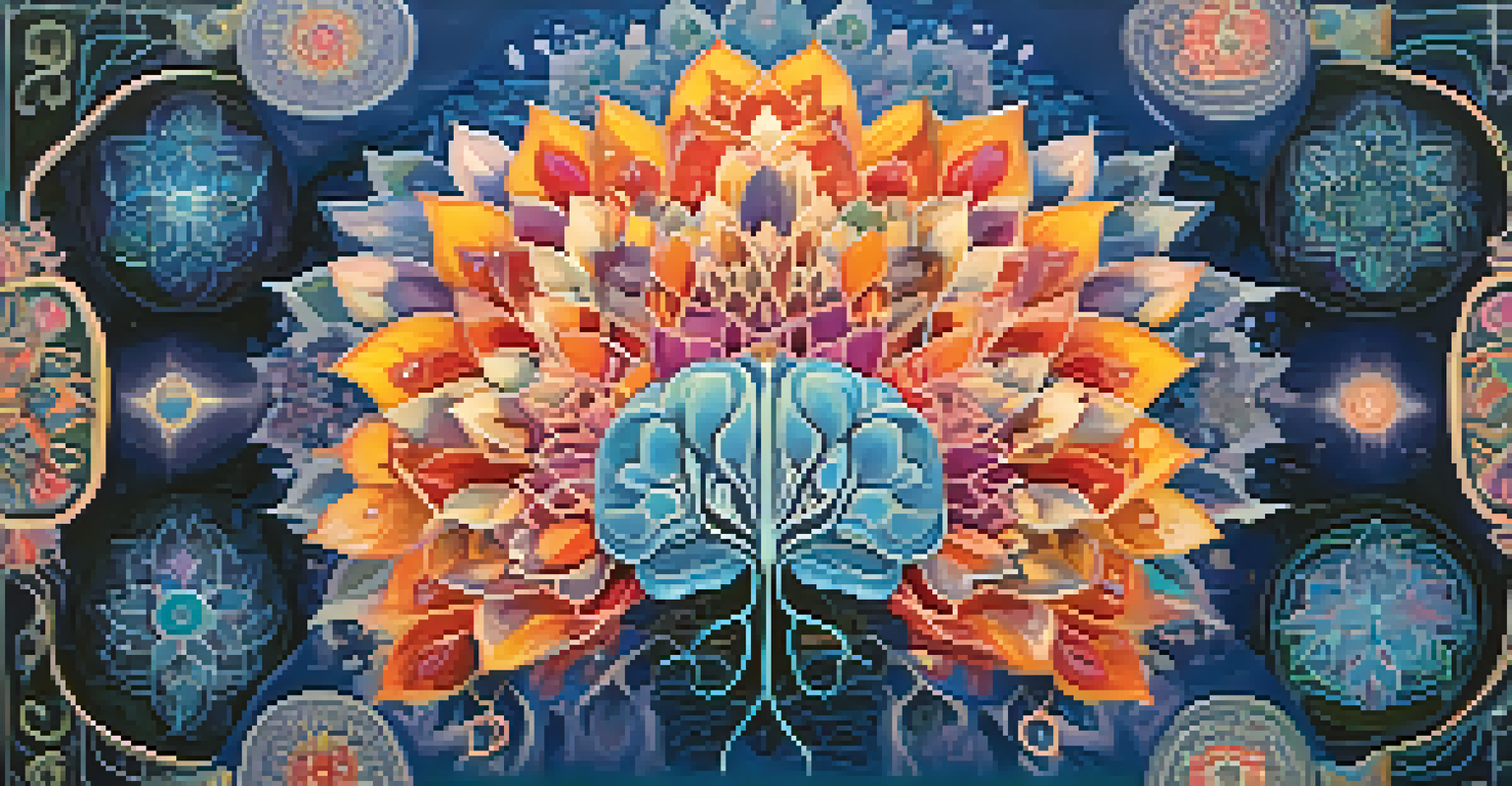Psychedelic Therapy: A New Frontier in Social Activism

Understanding Psychedelic Therapy and Its Roots
Psychedelic therapy involves the use of substances like psilocybin and MDMA to facilitate mental health healing. This therapeutic approach has deep historical roots, tracing back to indigenous cultures that have long recognized the healing properties of these substances. In recent years, the mental health crisis has sparked renewed interest in psychedelics, prompting researchers to explore their potential benefits in treating conditions like PTSD and depression.
Psychedelics are not just substances; they are tools for healing and transformation.
The resurgence in psychedelic research is not just a scientific phenomenon; it has also become a focal point for social activism. Advocates argue that access to these therapies can empower marginalized communities, particularly those affected by trauma and systemic inequities. By integrating psychedelic therapy into broader mental health initiatives, activists aim to challenge the status quo and promote more inclusive care.
As we delve into this new frontier, it’s essential to understand the intersection of psychedelics, mental health, and social justice. This exploration can illuminate how these therapies can be a powerful tool for healing, not just on an individual level but for communities striving for change.
The Science Behind Psychedelics and Healing
Research has shown that psychedelics can profoundly alter consciousness, which in turn helps individuals reprocess traumatic memories. For instance, studies on MDMA-assisted therapy have demonstrated significant reductions in PTSD symptoms among participants. This scientific backing is crucial for legitimizing psychedelic therapy as a viable treatment option in mainstream mental health care.

Moreover, psychedelics can foster feelings of connectedness and empathy, which are vital components in therapeutic settings. When individuals feel more connected to themselves and others, they may be more open to discussing painful experiences and emotions. This shift can lead to breakthroughs in therapy that traditional approaches sometimes fail to achieve.
Psychedelic Therapy's Historical Roots
Psychedelic therapy has deep historical roots in indigenous cultures, with renewed interest due to the current mental health crisis.
As scientists continue to unravel the mechanisms behind these substances, the potential for psychedelics to become a standard part of therapeutic practice grows. This evolving understanding is pivotal in making the case for broader access, especially for marginalized populations who might benefit the most.
Psychedelic Therapy and Social Justice
The conversation around psychedelic therapy extends beyond individual healing; it intersects significantly with social justice movements. Many activists advocate for the decriminalization and accessibility of psychedelics, arguing that these therapies should be available to everyone, not just those who can afford it. This push aligns with broader efforts to address systemic inequalities in healthcare.
The future of mental health care will be defined by the integration of psychedelic therapy into mainstream practices.
For communities historically affected by trauma—due to war, oppression, or systemic racism—psychedelic therapy presents a unique opportunity for healing and empowerment. Many activists are working to ensure that these therapies are not just a privilege for the few but can reach those who need them most. This approach can help dismantle barriers and foster a more equitable mental health landscape.
By integrating psychedelic therapy into social justice frameworks, advocates are paving the way for a more inclusive approach to mental health care. This fusion of healing and activism can inspire a new wave of community-driven initiatives that prioritize mental wellness for all.
Case Studies: Transformative Impact of Psychedelic Therapy
Real-life case studies provide powerful narratives that illustrate the potential of psychedelic therapy. For example, individuals who participated in MDMA-assisted therapy reported not only relief from PTSD symptoms but also profound personal transformations. These stories highlight the capacity of psychedelics to facilitate healing processes that extend beyond conventional methods.
Another compelling case involves the use of psilocybin in treating depression. Participants in clinical trials have shared experiences of heightened emotional awareness and a renewed sense of purpose following therapy sessions. Such transformations not only impact individuals but can also ripple through their communities, fostering collective healing and resilience.
Social Justice and Psychedelics
Advocates are pushing for the decriminalization and accessibility of psychedelics to ensure equitable mental health care for marginalized communities.
These case studies serve as a testament to the effectiveness of psychedelic therapy, encouraging further exploration and acceptance within the mental health community. They also emphasize the importance of sharing these stories to inspire others and highlight the potential for change.
The Role of Community in Psychedelic Activism
Community plays a vital role in the burgeoning field of psychedelic activism. Grassroots organizations are emerging, focusing on educating the public about the benefits and uses of psychedelics. These groups often aim to demystify these substances, fostering safer environments for discussions and experiences around their use.
Furthermore, community-centered approaches to psychedelic therapy emphasize inclusivity and shared experiences. By creating spaces where individuals can share their journeys, communities cultivate a supportive network that encourages healing. This sense of belonging can be incredibly empowering, especially for those who may feel isolated in their struggles.
As more communities rally around psychedelic activism, the movement gains momentum and visibility. This collective effort not only contributes to the acceptance of psychedelics in therapeutic contexts but also underscores the importance of community in fostering mental health and well-being.
Challenges and Ethical Considerations
Despite the promising potential of psychedelic therapy, several challenges and ethical considerations must be addressed. One major concern is the commercialization of psychedelic substances, which could lead to inequitable access and exploitation. As this field grows, it is crucial to ensure that the benefits of these therapies are not overshadowed by profit motives.
Another significant challenge is the need for appropriate training and regulation for therapists administering these treatments. Ensuring that practitioners are well-equipped to handle the complexities of psychedelic therapy is essential for patient safety and efficacy. The development of ethical guidelines and training programs will be vital in navigating this new landscape.
Community's Role in Healing
Grassroots organizations are key in educating the public about psychedelics, creating supportive spaces that foster healing and inclusivity.
By confronting these challenges head-on, the psychedelic community can work towards a more ethical and equitable framework. This proactive approach will help build trust and ensure that the benefits of psychedelic therapy are accessible to all.
The Future of Psychedelic Therapy in Activism
Looking ahead, the future of psychedelic therapy in the context of social activism appears promising. As more research validates the efficacy of these treatments, we can expect increased public interest and support for their integration into mental health care. This growing acceptance could pave the way for more inclusive policies that prioritize access for all individuals, regardless of background.
Additionally, as communities continue to advocate for the decriminalization of psychedelics, we may see a shift in public perception and legislation. This change could lead to increased funding for research and therapy programs, particularly targeting underserved populations. The ripple effects of these changes could transform the mental health landscape significantly.

Ultimately, the intersection of psychedelic therapy and social activism holds great potential for fostering healing and social change. By prioritizing equity and accessibility, this movement can inspire a new era of mental health care that is compassionate, inclusive, and transformative.